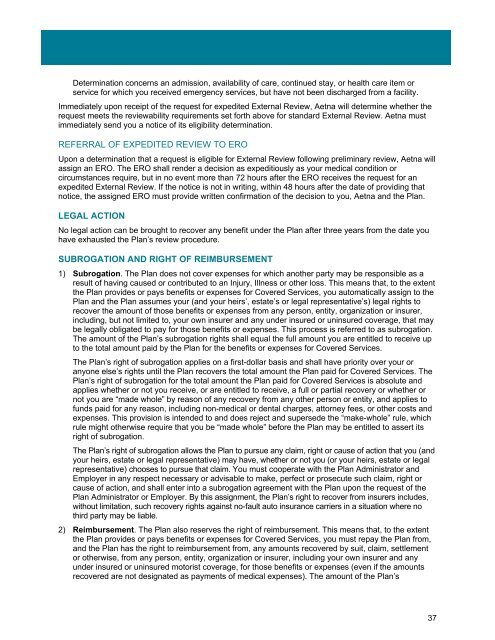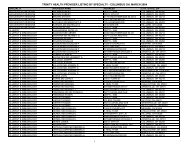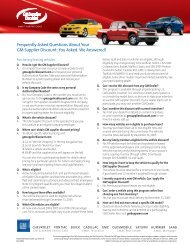AETNA PPO PLAN - My Benefits Portfolio - Trinity Health
AETNA PPO PLAN - My Benefits Portfolio - Trinity Health
AETNA PPO PLAN - My Benefits Portfolio - Trinity Health
Create successful ePaper yourself
Turn your PDF publications into a flip-book with our unique Google optimized e-Paper software.
Determination concerns an admission, availability of care, continued stay, or health care item or<br />
service for which you received emergency services, but have not been discharged from a facility.<br />
Immediately upon receipt of the request for expedited External Review, Aetna will determine whether the<br />
request meets the reviewability requirements set forth above for standard External Review. Aetna must<br />
immediately send you a notice of its eligibility determination.<br />
REFERRAL OF EXPEDITED REVIEW TO ERO<br />
Upon a determination that a request is eligible for External Review following preliminary review, Aetna will<br />
assign an ERO. The ERO shall render a decision as expeditiously as your medical condition or<br />
circumstances require, but in no event more than 72 hours after the ERO receives the request for an<br />
expedited External Review. If the notice is not in writing, within 48 hours after the date of providing that<br />
notice, the assigned ERO must provide written confirmation of the decision to you, Aetna and the Plan.<br />
LEGAL ACTION<br />
No legal action can be brought to recover any benefit under the Plan after three years from the date you<br />
have exhausted the Plan’s review procedure.<br />
SUBROGATION AND RIGHT OF REIMBURSEMENT<br />
1) Subrogation. The Plan does not cover expenses for which another party may be responsible as a<br />
result of having caused or contributed to an Injury, Illness or other loss. This means that, to the extent<br />
the Plan provides or pays benefits or expenses for Covered Services, you automatically assign to the<br />
Plan and the Plan assumes your (and your heirs’, estate’s or legal representative’s) legal rights to<br />
recover the amount of those benefits or expenses from any person, entity, organization or insurer,<br />
including, but not limited to, your own insurer and any under insured or uninsured coverage, that may<br />
be legally obligated to pay for those benefits or expenses. This process is referred to as subrogation.<br />
The amount of the Plan’s subrogation rights shall equal the full amount you are entitled to receive up<br />
to the total amount paid by the Plan for the benefits or expenses for Covered Services.<br />
The Plan’s right of subrogation applies on a first-dollar basis and shall have priority over your or<br />
anyone else’s rights until the Plan recovers the total amount the Plan paid for Covered Services. The<br />
Plan’s right of subrogation for the total amount the Plan paid for Covered Services is absolute and<br />
applies whether or not you receive, or are entitled to receive, a full or partial recovery or whether or<br />
not you are “made whole” by reason of any recovery from any other person or entity, and applies to<br />
funds paid for any reason, including non-medical or dental charges, attorney fees, or other costs and<br />
expenses. This provision is intended to and does reject and supersede the “make-whole” rule, which<br />
rule might otherwise require that you be “made whole” before the Plan may be entitled to assert its<br />
right of subrogation.<br />
The Plan’s right of subrogation allows the Plan to pursue any claim, right or cause of action that you (and<br />
your heirs, estate or legal representative) may have, whether or not you (or your heirs, estate or legal<br />
representative) chooses to pursue that claim. You must cooperate with the Plan Administrator and<br />
Employer in any respect necessary or advisable to make, perfect or prosecute such claim, right or<br />
cause of action, and shall enter into a subrogation agreement with the Plan upon the request of the<br />
Plan Administrator or Employer. By this assignment, the Plan’s right to recover from insurers includes,<br />
without limitation, such recovery rights against no-fault auto insurance carriers in a situation where no<br />
third party may be liable.<br />
2) Reimbursement. The Plan also reserves the right of reimbursement. This means that, to the extent<br />
the Plan provides or pays benefits or expenses for Covered Services, you must repay the Plan from,<br />
and the Plan has the right to reimbursement from, any amounts recovered by suit, claim, settlement<br />
or otherwise, from any person, entity, organization or insurer, including your own insurer and any<br />
under insured or uninsured motorist coverage, for those benefits or expenses (even if the amounts<br />
recovered are not designated as payments of medical expenses). The amount of the Plan’s<br />
37





